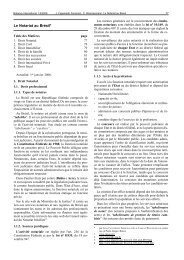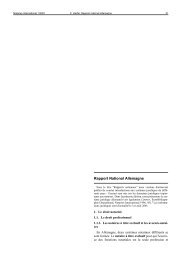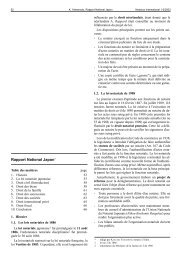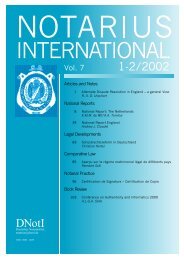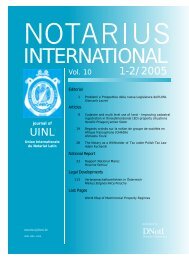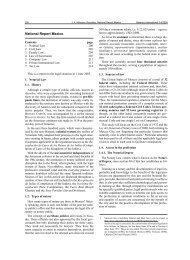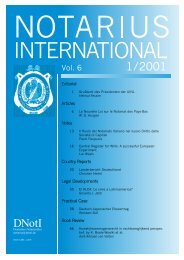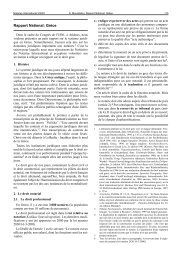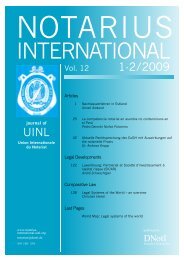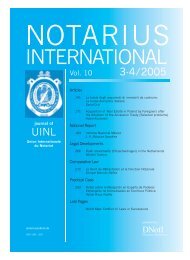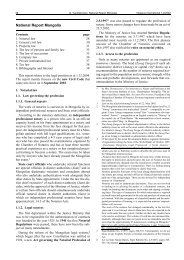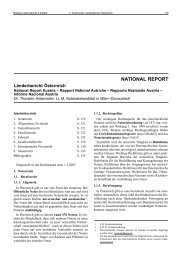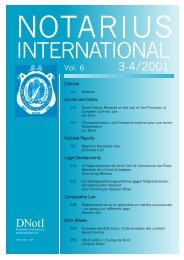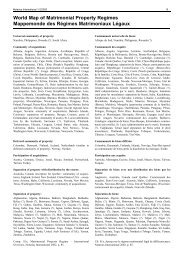ARTICLES and NOTES - Notarius International
ARTICLES and NOTES - Notarius International
ARTICLES and NOTES - Notarius International
Create successful ePaper yourself
Turn your PDF publications into a flip-book with our unique Google optimized e-Paper software.
144 T. Antenreiter, National Report Austria <strong>Notarius</strong> <strong>International</strong> 3-4/2002<br />
The most important consequences of this situation are<br />
shown in the legal form of the public limited company, in<br />
that the shareholder’s personal liability is excluded <strong>and</strong><br />
the basic capital is divided up into st<strong>and</strong>ardised portions,<br />
namely shares, which are legally <strong>and</strong> practically relatively<br />
easy to transfer. The company’s operational activities<br />
are dealt with by special executive organs of the company,<br />
<strong>and</strong> it is for this reason that strong protective measures<br />
in favour of the shareholders <strong>and</strong> creditors have to be<br />
observed.<br />
The basic capital of the company amounts to<br />
70,000.00 €<strong>and</strong> is divided up into shares which can either<br />
be issued as par-value shares (Nennbetragsaktien) or as<br />
no-par-value shares (Stückaktien) 95 . Par-value shares<br />
are issued for a particular amount, which must be at least<br />
€1.00 or a multiple thereof. No-par-value shares have no<br />
face value <strong>and</strong> for this reason the extent of participation<br />
in the public limited company merely results from the<br />
proportion one share bears to the other no-par-value<br />
shares, because in this case there is only a single denomination.<br />
There are two different methods of forming a public<br />
limited company, namely single-step formation or formation<br />
through simultaneous subscription of all the<br />
shares (Einheitsgründung/Simultangründung) <strong>and</strong> incorporation<br />
by stages or successive formation (Stufengründung/Sukzessivgründung).<br />
The only practical significance<br />
is with single-step formation, where the promoters<br />
subscribe to all the shares along with the obligation to<br />
pay their contributions in the amount of the issue price,<br />
with at least one quarter of the basic capital having to be<br />
paid up in accordance with regulations. In the case of incorporation<br />
by stages only a part of the basic capital is<br />
subscribed to by the promoters <strong>and</strong> the remaining amount<br />
is offered to a wider public, so that numerous complicated<br />
protective measures have to be observed, which has<br />
prevented this type of formation from becoming more<br />
widespread 96 .<br />
There has to be a written company contract (memor<strong>and</strong>um<br />
<strong>and</strong> articles of association) between the shareholders<br />
in the form of a notarial instrument. The contract<br />
must, as a minimum, contain the following:<br />
- company name with the suffix “Aktiengesellschaft” or<br />
a corresponding abbreviation (AG)<br />
- registered office<br />
- company objects<br />
- basic capital <strong>and</strong> share denominations (no-par-value<br />
or par-value shares)<br />
- executive organs of the company<br />
- duration of the company<br />
- apportionment of formation costs.<br />
A public limited company is a legal entity <strong>and</strong> thus an<br />
independent holder of rights <strong>and</strong> duties; it is represented<br />
externally by the management board, which in turn is appointed<br />
by the supervisory board. The legal entity comes<br />
into being in external terms upon its computerised registration<br />
in the Companies Register of the Republic of<br />
Austria. All public limited companies have merchant<br />
status through their registration in the Companies Register.<br />
The following documents are necessary in every case<br />
for registration in the Companies Register:<br />
- an official copy of the memor<strong>and</strong>um <strong>and</strong> articles of<br />
association<br />
- resolution of the supervisory board (Aufsichtsrat)<br />
concerning the appointment of the management board<br />
(Vorst<strong>and</strong>) <strong>and</strong> its authority to represent the company<br />
- formation report by the promoters<br />
- management board <strong>and</strong> supervisory board (Aufsichtsrat)<br />
reports<br />
- specimen signatures of the members of the management<br />
board<br />
- bank confirmation evidencing the paying in of at least<br />
one quarter of the basic capital<br />
- self-assessment declaration or fiscal clearance certificate<br />
from the Tax Office as proof of payment of the<br />
Capital Contribution <strong>and</strong> Transfer Tax (1% of the<br />
paid-up share capital) 97<br />
- apportionment of formation costs.<br />
The involvement of a notary is necessary in relation to<br />
the establishment of the memor<strong>and</strong>um <strong>and</strong> articles of association<br />
<strong>and</strong> additionally, for example, in relation to subsequent<br />
share subscriptions by the promoters, the appointment<br />
of the first supervisory board <strong>and</strong> of the auditor<br />
for the first annual accounts, in relation to all resolutions<br />
of shareholders’ meetings <strong>and</strong> also in the case of<br />
various re-organisation measures (mergers, split-offs <strong>and</strong><br />
conversions) 98 .<br />
The main statutory source is the currently valid version<br />
of the Law on Public Limited Companies 1965 (Aktien-<br />
Gesetz).<br />
6.3.4. Co-operatives<br />
The Law on Co-operatives (Genossenschaftsgesetz:<br />
GenG) defines co-operatives (Genossenschaften) as associations<br />
with an open number of members, which essentially<br />
serve to further the income or business of their<br />
members 99 . Co-operatives occupy a half-way position<br />
between personal companies <strong>and</strong> companies limited by<br />
shares. The features of companies limited by shares<br />
which they possess are legal personality <strong>and</strong> limited liability<br />
for their members.<br />
Formation requires articles of association entered into<br />
in writing (statutes) with a certain minimum content<br />
100 . As membership is open <strong>and</strong> each member must<br />
subscribe to a share in the co-operative, the capital of the<br />
co-operative is also variable. As a rule the executive or-<br />
95 Arts.7 <strong>and</strong> 8 Law on Public Limited Companies<br />
96 Second part of the Law on Public Limited Companies (Arts.16 to 47<br />
Law on Public Limited Companies)<br />
97 Self-assessment of the Capital Contribution <strong>and</strong> Transfer Tax operates<br />
in the same way as self-assessment of Property Transfer Tax. On<br />
self-assessment see in detail No. 8. (Tax law)<br />
98 See Wagner/Knechtel, Law on Notaries Public, on Art. 1 Law on Notarial<br />
Instruments, page 695<br />
99 Art. 1 Law on Co-operatives<br />
100 Art. 5 Law on Co-operatives



